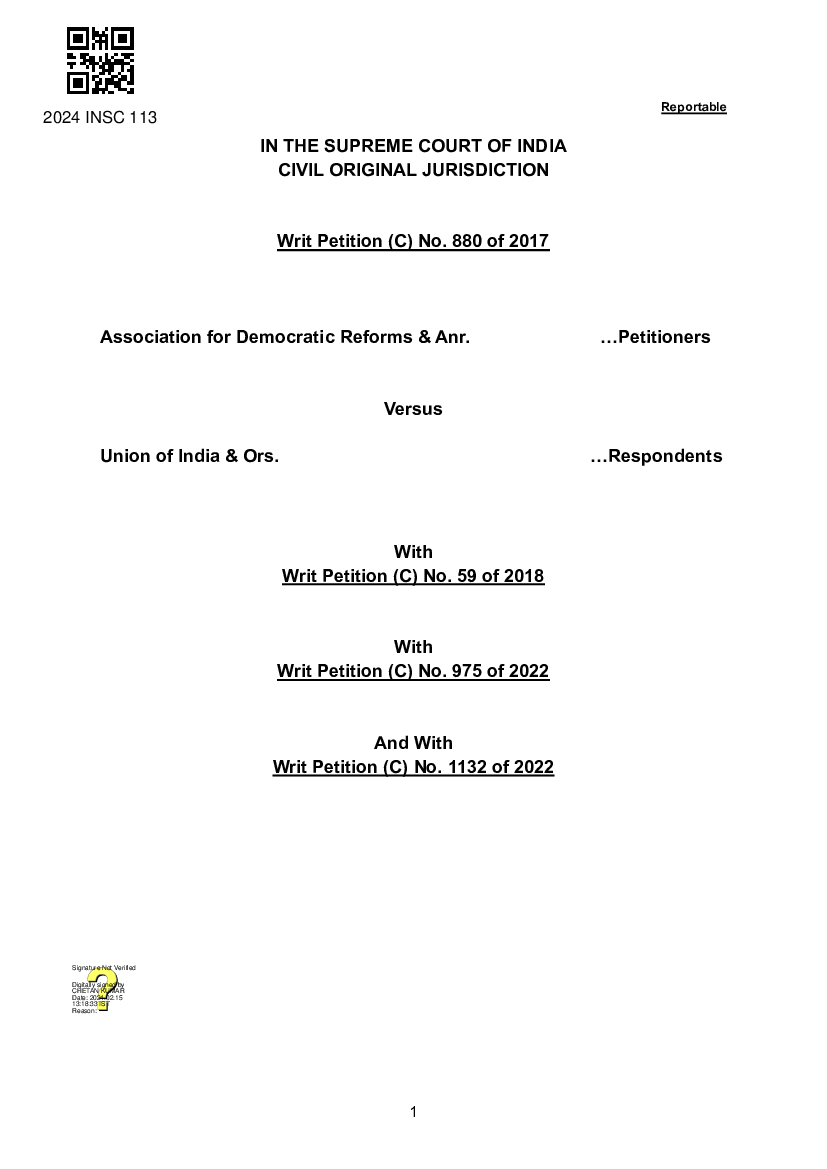The Supreme Court on Thursday emphasized voters' right to information for its cardinality in ensuring purity in elections that support democracy, ruling that it trumped the corporate sector's right to informational privacy constitutionally. "Information about funding of political parties is essential for effective exercise of the choice of voting," the court said, emphatically declaring the winner in the rights-versus-rights battle.
It all came down to a duel between citizens' right to information and the right of corporate houses to informational privacy, with the former coming out on top. Putting a premium on voters' right to information for its cardinality in maintaining purity in elections that sustain democracy, Supreme Court on Thursday said constitutionally, it far outweighed the corporate sector's right to informational privacy.
"Information about funding of political parties is essential for effective exercise of the choice of voting," the court said, emphatically declaring the winner in the rights-versus-rights battle.
Interestingly, the Electoral Trust Scheme floated by UPA govt in 2013 found favour with SC. "For contributions above Rs 20,000, contributions through electoral trust is the least restrictive mean," SC said. Under the Electoral Trust Scheme notified on Jan 31, 2013, companies were permitted to form trusts and accumulate donations for proportional contributions to political parties.
CJI D Y Chandrachud, writing the judgment for himself and Justices B R Gavai, J B Pardiwala and Manoj Misra, said, "Information about funding of political parties is essential for effective exercise of the choice of voting. One of the factors which contributes to political inequality is the difference in the ability of people to influence political decisions because of economic inequality. The infringement of the right to information is not proportionately justified for the purpose of curbing black money in electoral financing."

he bench rejected govt's defence that electoral bonds encouraged corporate donors to use banking channels and helped eliminate black money in elections. It said there could be other, far-less restrictive methods to check the use of black money.
The five-judge bench did recognise the essentiality of maintaining confidentiality about contributions to parties to protect political affiliation of individual contributors and corporate entities. However, it said the two did not operate on the same plane and drew a distinction between huge corporate donations and those by "students, daily wage workers, artists and teachers", the latter lot being purely for expression of political support.
It said contributions below Rs 20,000 were incapable of influencing policy decisions of govts and, hence, rightly protected by bringing them under privacy cover to protect the identity of sub-Rs 20,000 donors.
SC stops electoral bonds scheme, asks SBI to provide poll bonds information to EC
"The anonymity of the contributor is intrinsic to the electoral bond scheme. The electoral bond is not distinguishable from other modes of contributions through banking channels such as cheque transfer, transfer through the Electronic Clearing System or direct debit if the anonymity component of the scheme is struck down. Thus, the electoral bond scheme 2018 will have to be struck down as unconstitutional," the bench said.
The CJI said, "Economic inequality leads to differing levels of political engagement because of the deep association between money and politics. At a primary level, political contributions give a 'seat at the table' to the contributor. That is, it enhances access to legislators.
"This access also translates into influence over policy making. There is also a legitimate possibility that financial contribution to a political party would lead to quid pro quo arrangements because of the close nexus between money and politics. Quid pro quo arrangements could be in the form of introducing a policy change or granting a licence to the person making financial contribution to the political party in power."
Justice Sanjiv Khanna, while penning a separate concurring opinion, said though his conclusions were identical to the one reached by the CJI-led judges, he had attempted to explain in a simpler way the logic behind the voiding of electoral bonds.
The SC said the right to information, guaranteed under Article 19(1)(a), could only be curbed by the restrictions specified by the Constitution under Article 19(2). "The purpose of curbing black money in elections (a reason ascribed by govt for introducing electoral bonds in 2018) is not traceable to any of the grounds in Article 19(2)," it said.
"On an overall balance of the impact of the alternative means on the right to information and its ability to fulfil the purpose, for contributions below Rs 20,000, contributions through other means of electronic transfer are the least restrictive means," the bench said.

